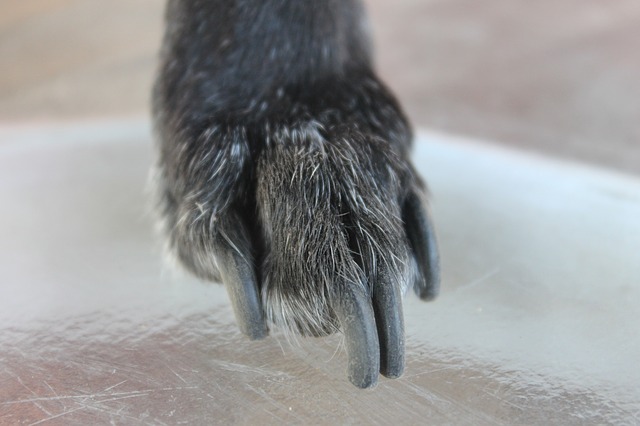
Has your dog started to slow down as he’s gotten older? If it takes him a little longer to get out of bed in the morning or if he’s sluggish on walks, he may be suffering from stiff, achy, and possibly arthritic joints. Is it really necessary to put him on a vet-prescribed medicine, or are there things you can do for your dog or provide in his diet that might help ease the pain in his joints? While you should still get a diagnosis from your vet to rule out more serious health conditions, there are many home remedies that may help improve your dog’s quality of life.

Things you can do to help
#1 – Maintain a healthy weight
Excess weight will put extra strain on your dog’s already aching joints. Use diet and exercise to reduce your dog’s weight if necessary.
#2 – Alter, but don’t eliminate, exercise
Staying active will actually help reduce stiffness in your dog’s joints, but he will benefit more from several shorter walks throughout the day rather than one or two longer ones, which may be rough on already sore joints.
#3 – Raise food and water bowls
This is not recommended for dog breeds that are prone to bloat. Otherwise, having raised food and water bowls can help reduce strain in the back and neck caused by bending down to reach bowls on the floor.

#4 – Prevent slipping
Slipping on hardwood floors or icy sidewalks can put a lot of extra strain on your dog’s joints. Carpet runners or dog booties may help your dog maintain his footing and reduce the amount of strain he puts on his joints just by walking around the house.
#5 – Use a ramp
It might be too difficult for your dog to hop into your car or onto your bed all by himself. Jumping can be extremely painful for dogs with joint problems, so ramps and stairs can make a big difference in your dog’s quality of life.
#6 – Keep nails trimmed
According to Whole Dog Journal:
“If nails are too long they can change the gait on the dog, causing skeletal changes and arthritis in the foot/toes.”
If your dog’s nails have been overgrown for quite a long time, they may not be able to be trimmed back very far without causing your dog to bleed. Weekly nail trims or grinding will be required to slowly get the quick (a vein in the nail) to recede in order to get your dog’s nails to a proper length.

#7 – Provide a soft, supportive bed
Sore joints need more cushion to be comfortable. Lying on the floor with little to no cushioning causes painful pressure points. Investing in a high-quality orthopedic bed may help your dog start his mornings with a little less pain.
#8 – Acupuncture
Acupuncture helps to stimulate the body’s own anti-inflammatory and pain-reducing responses. The tiny needles involved stimulate nerves, blood vessels, and lymphatic bundles in order to improve blood flow, release pain-fighting enkephalins, and reduce inflammation. While it may not be a great option for dogs who dislike being handled, it can be a great supplemental treatment program that may bring your dog a lot of pain relief.

#9 – Massage therapy
Canine massage therapy can help improve blood circulation, loosen stiff muscles, and be very relaxing. There are some techniques you can learn to do yourself or you may prefer to find somebody who has been nationally certified in canine massage and acupressure.
#10 – Homeopathy
According to Dog Guide:
“Dog homeopathy is the act of combining a blend of medicinal herbs which present no side effects with dogs.”
Homeopathy can be confusing to those who aren’t familiar with it and may be best handled by an experienced holistic veterinarian.

Foods and supplements that may help
#11 – Cayenne
The main compound in the spicy cayenne pepper, capsaicin, can help to block pain and increase circulation. Capsaicin is a common ingredient in topical products for humans to use for pain, and it’s equally effective for dogs. Be careful about using these products on your dog, as ingestion may make your dog sick. You can also apply a pinch of cayenne pepper to your dog’s food.
#12 – Licorice
According to Dogs Naturally Magazine:
“Licorice is a member of the pea family and it’s the root that has medicinal properties. One of its many uses is to treat arthritis. Many studies have confirmed that it’s a fast acting and effective anti-inflammatory agent. Some herbalists claim that its primary component, glycyrrhizin, increases the effectiveness of other herbs when it’s included in a compound formula. Glycyrrhizin’s chemical structure is similar to corticosteroids, but without the negative effects on the immune system.”
Licorice is commonly administered to dogs as a tincture or a tea.

#13 – Ginger
Ginger is able to stop the nervous system from producing leukotrienes, which cause inflammation. Ginger can also improve circulation. Small amounts of raw ginger can be added to your dog’s food, but it can be a blood thinner so should be avoided before surgery. It may also lower blood pressure or sugar levels, so talk to your vet before use if your dog has any health issues that may be negatively impacted by these possible side effects.
#14 – Yucca
Yucca has been shown to provide relief from joint pain and inflammation in humans and is thought to work the same in dogs. Powdered yucca may be added to your dog’s food, but it can cause stomach irritation and vomiting when used daily, so it’s recommended to give your dog a 2-day break every week.

#15 – Feverfew
Feverfew is an herb with anti-inflammatory properties. For pets, it is commonly administered as a tincture or a tea.
#16 – Horsetail
Horsetail has the ability to heal bone and connective tissue thanks to its bioactive silicon, which aids in the formation of bone, cartilage, skin, and other connective tissues. It combines well with glucosamine and chondroitin supplements for optimal joint health. Horsetail shouldn’t be used in dogs with heart problems or high blood pressure. It should also be avoided in nursing dogs.
#17 – Alfalfa
Alfalfa can help with arthritis and is safe to give every day. You’ll want to use alfalfa that hasn’t flowered yet, and avoid giving the seeds as they can cause blood disorders.

#18 – Glucosamine/chondroitin and MSM
These three nutrients are the go-to for most dog owners who start to observe wear and tear on their dog’s joints. Glucosamine, chondroitin, and MSM have all been shown to reduce inflammation in dogs with arthritis.
#19 – Fish oil
Fish oil contains the fatty acids EPA and DHA, which are important components of cell membranes. They signal cells to decrease inflammation. Less inflammation means less pain, redness, swelling, and irritation of the skin, joints, and internal organs.
#20 – Enzymes
According to Natural Dog Health Remedies:
“Enzymes (in particular proteolytic enzymes or proteases), if given in between meals, can work systemically to fight inflammation and joint pain…Enzymes are ‘organic catalysts.’ They either initiate or speed up chemical reactions in the body, from digestion to tissue repair, and from hormone function to energy production.”

Hopefully you’ve found a few things on this list to be helpful in your quest to improve your dog’s quality of life!
These statements have not been evaluated by the Food and Drug Administration. This product is not intended to diagnose, treat, cure, or prevent any disease. The information on this website is not intended to replace a one-on-one relationship with a qualified health care professional.
(H/T: Dogs Naturally Magazine, Whole Dog Journal, Dog Guide, Natural Dog Health Remedies)
via Whisker Therapy